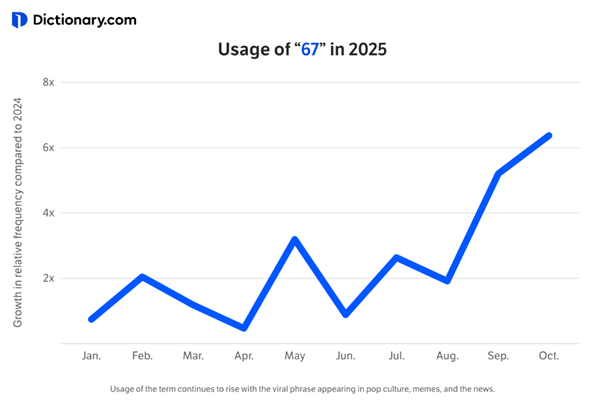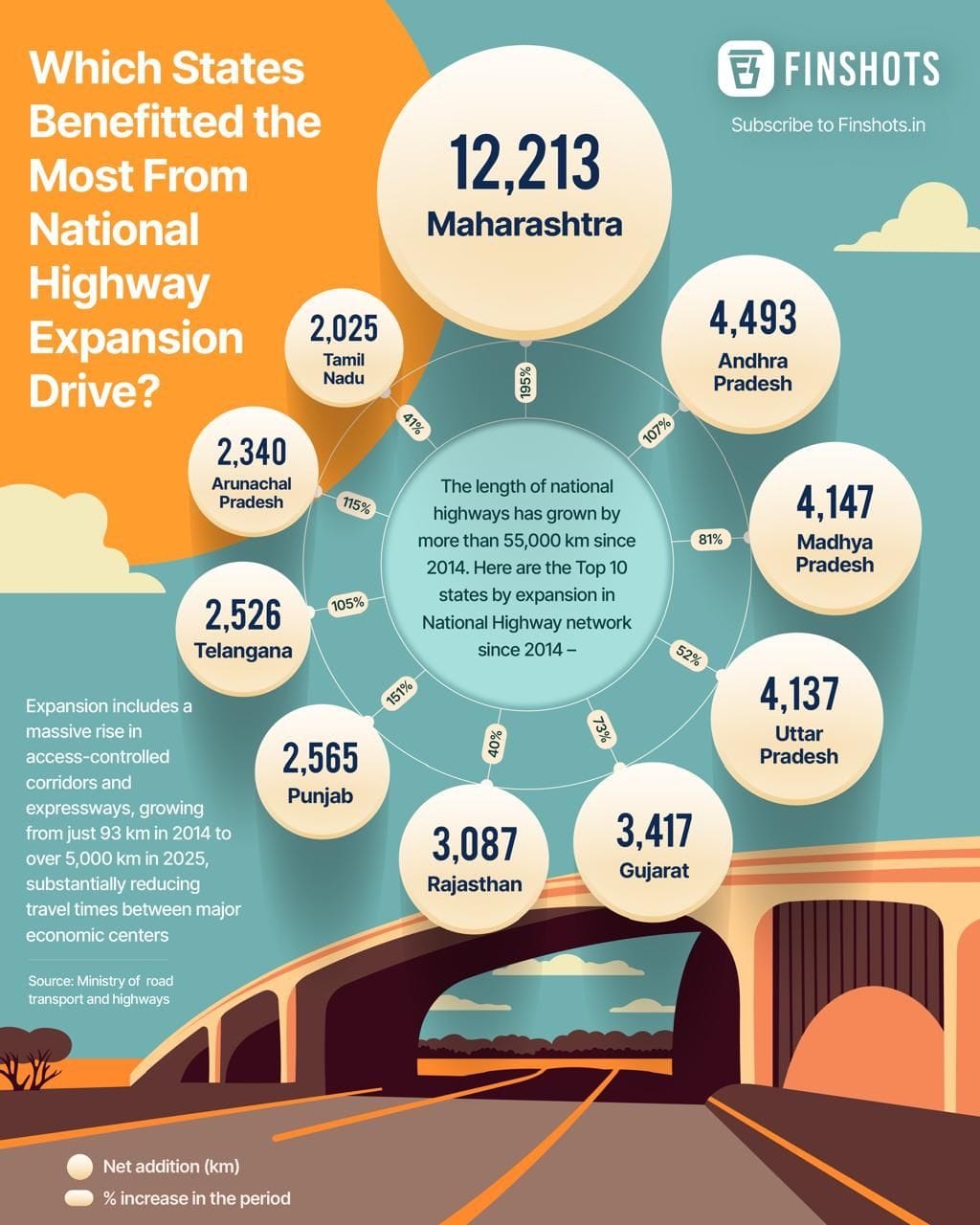🍳3I/ATLAS, 67 and more...

Hey folks!
Not long ago, we wrote about skibidi and delulu making it to the Cambridge English Dictionary, and how various words even make it there in the first place. And you might be thinking, “Why are we writing about this again?” But hear us out, because this one’s a little different.
So the latest word of the year on dictionary.com isn’t even a real word. It’s a number! Or rather, two numbers.
“67”. “Six seven.”
And before you ask, nope, it’s not “sixty-seven.” It’s always said as six seven.
And that’s about as much as even the folks at the dictionary.com seem to know. Because apparently, nobody really knows what ‘six seven’ means. Not the linguists, not the parents who keep hearing it from their kids, and definitely not the Premier of Victoria, Australia, who admitted at a press conference that it “actually means nothing!”
Yet it’s everywhere — in classrooms, TikToks, even memes about a boy now forever known as the “67 Kid.”
So how the heck did these two random numbers go this viral, you ask?
Well, it started with a 2024 song called “Doot Doot (6 7)” by US rapper Skrilla, which somehow found its way into Gen Alpha slang. And since then, searches for “67” have jumped more than sixfold — and unlike other two-digit numbers, none of them saw anything remotely similar.

Add a viral hand gesture (both palms bouncing up and down), a few chaotic basketball edits, and a generation itching to confuse their parents… and you’ve got the perfect recipe for nonsense going mainstream.
Basically, six seven means… whatever you want it to mean. Sometimes it’s “so-so.” Sometimes it’s a punchline. Sometimes it’s just pure confusion. (“How was school today?” “Six seven!”)
Now, this sure is nuts. But that’s also what makes it fascinating. Because it’s not about the definition but about vibe recognition. Like a secret code, a digital shrug and a generational smirk in number form.
Because languages go through transitions. For instance, some studies say how teenage girls lead language innovation and have done so for centuries. And maybe today it isn’t just about clarity, but also about chaos, context, and connection. And when a phrase like six seven rockets around the world in months, it tells you something about how fast in-jokes now become vocabulary.
A full-blown micro‑language that means absolutely nothing — and somehow says everything.
So yeah, six seven might not belong in a spelling bee. But in the age of algorithmic brainrot, it might just be the most accurate word of the year yet.
Might be irritating to some, totally nonsensical to the other, and a way of expression to someone else. Six Seven! 🤷
Here’s a soundtrack to put you in the mood 🎵
Kaanthaa by Masala Coffee
Ready to roll?
What caught our eye this week 👀
What’s 3I/ATLAS Anyway?!
You might’ve wondered if there’s extraterrestrial life out there.
Not Jadoo on a cycle that you might have seen in ‘Koi… Mil Gaya’ type but something subtler, stranger. Like a cosmic traveller, born before our Sun, and now quietly cruising past Earth with absolutely no interest in us.
That’s pretty much what 3I/ATLAS — a comet from another star system – is said to be.
Yep. An actual interstellar object and only the third one humanity’s ever spotted. It doesn’t orbit the Sun. It’s not from “our side of the sky.” It’s just… passing through.
How did we discover it?
Okay, so it was discovered this July by a telescope in Chile, and it immediately raised eyebrows. Because its path was ‘hyperbolic’, meaning it wasn’t looping around anything, just zipping in from one side of the galaxy and back out the other. Like a tourist who doesn’t even stop for photos.
But here’s where things get wild. Scientists don’t just spot it and shrug. They study the glow of gas around it (called its coma) to decode what it’s made of. Think of it as space forensics via light. And what did the light say? That this comet is loaded with carbon dioxide, eight times more than water. And that’s weird since most comets around here are watery snowballs. This one? It’s more like a soda can than slushie.
But wait, why even talk about it, what does all of this have to do with me, you ask?
Nothing major, agreed. But, for starters, it challenges what we thought we knew about how comets form. If this is what space leftovers look like in other star systems, maybe “their” planets, and potential life there, are built from very different ingredients. And maybe Earth is not the cosmic template we assumed it was.
But move beyond this fascination, it’s not just science. It’s also shaking up the business of space.
Telescopes are racing to spot more of these fly-bys. Space agencies are building “Comet Interceptors” or probes that’ll wait in space and chase the next visitor. Even sci-fi writers and game studios are rethinking how to portray “alien arrivals.” Maybe it’s not always dramatic landings and laser beams. Maybe it’s quiet snowballs that remind us how tiny we are.
Because 3I/ATLAS isn’t coming to say hi. It won’t blink or burst into flames. But who knows, it might just shift how we think about life, motion, time… and the silent things still left unexplained.
And the cool thing is that it’s said that we’ll get to know more answers from 3I/ATLAS in the coming month when it inches closer to Earth before it passes by. Yet, the frightening thing is that it doesn’t give us a scare like the movie ‘Don’t Look Up’ where a giant rock finally crushes Earth after all the tomfoolery from millionaires fail to stop it.
Infographic 📊

📺Why “No Cost EMI” is the biggest lie you’ve been sold
In 1985, your grandfather bought a Bajaj scooter for ₹7,000 after saving for 3 years. He used it for 15 years and, when it was time for an upgrade, he sold it for ₹4,000.
But let’s talk about you . You bought a ₹1.5 lakh phone on “No Cost EMI” thinking it was smart. One year later, it’s worth ₹75,000, yet you still owe ₹82,000. Two years later, you’ve paid ₹1.8 lakh in hidden charges, the phone is worth ₹40,000, and you’re trapped.
Meanwhile, over 15 crore Indians are in the same situation, with EMIs on phones, TVs, laptops costing more than what they’re worth. Clearly, we’ve gone from a country of savers to a country of spenders. But how and why did that happen?
We unpack that in this episode of Finshots TV. Click here to check it out.
Readers Recommend 🗒️
This week, our reader, Rahul Sharma recommends listening to The Seen and the Unseen, a podcast by Amit Varma.
“It offers deep and balanced discussions on economics, society, and policy — the kind of thoughtful content that perfectly matches Finshots’ storytelling tone.” he says.
Thanks for the rec, Rahul!
That’s it from us this week. We’ll see you next Sunday!
Until then, send us your book, music, business movies, documentaries or podcast recommendations. We’ll feature them in the newsletter! Also, don’t forget to tell us what you thought of today's edition. Just hit reply to this email (or if you’re reading this on the web, drop us a message at morning@finshots.in).
🖖🏽
Don’t forget to share this edition on WhatsApp, LinkedIn and X.
